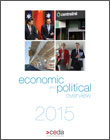PROGRESS 2050: Toward a prosperous future for all Australians
24/02/2015
Speaking at the launch of CEDA’s Economic and Political Overview (EPO) in Sydney, Mr Baird said the Government will be encouraging businesses from other states to operate in NSW.
“We’ll be aggressively targeting Queensland and Victoria to businesses there saying look come to the strength, come down and operate here because NSW is moving and we have the right environment and we want your business,” he said.
“I think we’re in a good position because the infrastructure spend is significant…and at the same time the environment of operation in NSW has become much more competitive on a relative basis.”
On the topic of what businesses need for growth, Mr Baird said a strong state economy and government is critical.
“A strong, stable, sensible government is critical because businesses need to have that assurance in order to put their capital at risk and make long term decisions,” he said.
At the event Mr Baird also outlined his government’s top 10 economic priorities which include investing in infrastructure and transport and reforming the NSW energy market.
Providing an economic outlook at the event, ANZ Banking Group Chief Economist and EPO contributing author, Warren Hogan said while mining exports will continue to be important, there will be a bigger shift towards a non-mining economy.
“Selling iron ore and coal is not our future…we now need to export other things, we need to go into other industries, services in particular to take advantage of those things in Asia,” he said.
Mr Hogan said the key for the economy in coming years will be in the broader business sector.
“To get this economy really going…we need outside of residential, outside of construction, we need the broader business sector to start investing again,” he said.
“We need banks, professional services firms, we need manufacturers to start expanding and employing people.”
Speaking on the year ahead, Mr Hogan said business confidence will be critical.
“Business confidence is so critical…that’s going to be the link I believe between the politics and the economy in this country in the next 12 months,” he said.
Discussing the current Federal political climate, Australian Financial Review National Affairs Columnist, Jennifer Hewett said it is unlikely Prime Minister Tony Abbott will resign but there is the possibility of a leadership spill.
“Sometime after the Budget…I think there will be a vote and at this stage Malcolm (Turnbull) would declare and then I think it would be almost impossible to survive,” she said.
Ms Hewett said the media and the public are on constant alert for any slight mistake by Abbott.
“Anything is possible in politics but I don’t see that the pressure both internally and externally (on Abbott) will relent.”
“Because the negativity has turned so much strongly, that actually (Malcolm) Turnbull with (Scott) Morrison as Treasurer will actually be much better with budget repair.”
On the topic of Labor in Opposition, Ms Hewett said it is possible Bill Shorten could be Prime Minister sooner than expected but Labor would prefer to go against Tony Abbott in an election.
“Shorten realises that despite all his expectations…that he’s actually on track to become Prime Minister in 18 months but they want Abbott to stay there,” she said.
Ms Hewett said in 2015 key topics on the agenda will remain the proposed university reforms and Medicare.
Discussing NSW politics at the event, Sydney Morning Herald State Political Editor, Sean Nicholls said a recent Fairfax survey shows the majority of people in NSW oppose the Government’s plans to privatise electricity assets.
“Less than one in four people backed privatisation of those assets, 23 per cent, an astonishing 67 per cent said no,” he said.
While it remains likely the Liberal Party will retain government after the March election, it is possible they will not have support for privatising electricity assets.
“If these results hold, the Baird Government will have won the election but it would have done so without support for its major policy initiative,” he said.
Mr Nicholls said it is unlikely the NSW election will see an outcome similar to Queensland.
“The ALP is realistic, it does not expect to win this election, it doesn’t anticipate doing a Palaszcuk,” he said.
“If it can exploit the primary campaign issue of electricity privatisation to the fullest extent, it can easily get within striking distance in 2010.”
“The election remains Mike Baird’s to lose.”
Click here for more videos including Q&A sessions from CEDA's Economic and Political Overview launch in Sydney.
 CEDA's Economic and Political Overview
CEDA's Economic and Political Overview
CEDA's Economic and Political Overview (EPO) is Australia's premier publication and series of briefings on the Australian economy and politics for the year ahead. Running for more than 30 years, the EPO brings together political, economic and business leaders and provides CEDA members with business intelligence on the environment they will be operating in over the next 12 months.
CEDA's 2015 EPO will provide economic and political forecasts and also examine funding options from the finance sector and some proposed market-based reforms and equity issues in Australia.
Download 2015 EPO publication (pdf)
Find our more about CEDA's EPO or read articles and watch videos from EPO events.
